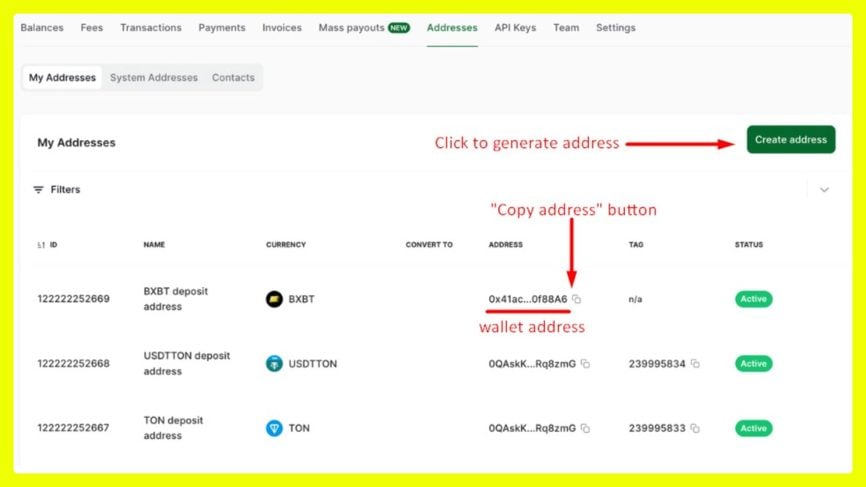What is a Wallet Address?
A wallet address is a unique string of characters used to receive cryptocurrency. It acts as the destination for digital asset transfers on a blockchain. Each address is linked to a crypto wallet.
Table of contents:
A wallet address is a unique string of characters used to receive cryptocurrency. It acts as the destination for digital asset transfers on a blockchain. Each address is linked to a crypto wallet. It’s similar to a mailing address, but for digital assets, which shows where cryptocurrency should be sent.
Businesses use wallet addresses to accept payments, manage digital assets, or operate within blockchain-based systems. The address ensures transparency and traceability on the blockchain while maintaining user privacy.
Here’s how wallet addresses can be utilized by different users:
| User | Use case of a wallet address |
|---|---|
| Freelancers | Receive payments in crypto from clients |
| Online retailers and service providers | Accept crypto payments when supported by their payment system |
| Payroll admins | Send crypto salaries or bonuses where it is legal and company policy allows |
How does a crypto wallet address work?
A crypto wallet address is part of a system built on two main elements: the public key and the private key. These cryptographic keys are generated together and serve different purposes.
What is a public key?
The public key is used to create your wallet address. It acts like a receiving terminal. Others can use it (or the wallet address derived from it) to send you crypto. It’s safe to share publicly.
Technically, your wallet address is a shortened, hashed version of this public key. The hash makes the address shorter and easier to handle while still linking it securely to the key pair.
What is a private key?
The private key is a secret code. It gives full control over the funds in your wallet address. Anyone with access to this key can move your crypto. That’s why it must remain strictly confidential.
Without the private key, it is impossible to access or transfer the crypto linked to the wallet address.
How do they work together?
When someone sends crypto to your wallet address:
- The transaction is recorded on the blockchain.
- The crypto becomes associated with that address.
- Only the private key holder can sign a transaction to move the funds.
This system keeps blockchains transparent (since anyone can see transactions tied to addresses) but secure (since only the private key can unlock access).
Our wallet generates these key pairs automatically behind the scenes. You don’t need to handle keys manually. The system provides you with a ready-to-use wallet address and manages private key security for you.

How to get a Bitcoin (BTC) wallet address?
To get a Bitcoin wallet address, create a Bitcoin-compatible wallet. Once set up, the software will generate a BTC address automatically. You can then share this address to receive Bitcoin.
Many businesses create multiple BTC wallet addresses to organize income across projects. For example, a digital services agency might generate a different address for each monthly retainer client. It simplifies accounting and improves payment tracking.
What is a wallet address example?
Crypto wallet addresses are strings of letters and numbers, designed for machine processing. Here’s an example of a wallet address:
0x742d35Cn6874C0532925a3b844Bc454e4438f44e (for illustration only)
Each blockchain uses its own format. A BTC address won’t work for ETH, and vice versa. It’s important to always verify the correct address format before sending or requesting crypto.
Do wallet addresses differ between cryptocurrencies?
Each blockchain has its own wallet address format. These formats are not compatible across networks. Sending funds to the wrong type of address can lead to permanent loss.
Here’s how wallet addresses typically look across major cryptocurrencies (all the examples are presented for illustration only):
- Starts with 1, 3, or bc1
- 26-35 characters
- Case-sensitive
- Example: bc1qw508d6qe…
- Starts with 0x
- Exactly 42 characters
- Not case-sensitive
- Example: 0x742d35Cc6634C0532925a3b844Bc454e4438f44e
- Starts with L or M
- Up to 34 characters
- Case-sensitive
- Example: LZHvU7Q6oB2KmWZ3LFVfLNo5yXRzUQTbzT
- Starts with r
- 34 characters
- May require a destination tag
- Example: rEb8TK3gBgk5auZkwc6sHnwrGVJH8DuaLh
Cardano (ADA)
- Starts with addr1
- 100+ characters
- Case-sensitive
- Example: addr1q9z0gk3…
To avoid confusion, some wallets clearly separate wallet addresses by blockchain and token. The interface ensures you’re using the correct address every time. It helps your team avoid manual errors and ensures funds are always sent where they belong.
Types of crypto wallets
Businesses have different crypto needs. That’s why there are several types of wallets:
- Hot wallets. Connected to the internet. Easy to access, ideal for frequent use. Hot wallets are designed to support fast transactions and reduce risk by implementing layered security measures.
- Cold wallets. They are offline and used for long-term holding and large balances. Less exposed to hacks, but less convenient for daily operations.
- Custodial wallets. A third party holds the private keys. Easier to manage, lower technical risk. Good for teams without in-house crypto expertise.
- Non-custodial wallets. The user holds the private keys. Allows full control but puts the burden of security on the user.
Our crypto wallet for business enables secure cryptocurrency payments.
It includes two blockchain risk-scoring systems designed to flag potentially suspicious activity and supports diversified treasury management. Funds are safeguarded using the Ledger Enterprise cold storage solution, providing robust, institutional-grade security.
"Accepting cryptocurrency is important for future-proofing your business, sure. But, it’s also about tapping into a global market, cutting costs, and offering a more secure, efficient way to transact right now."
What happens if you lose access to a wallet address?
Losing access to a wallet address isn’t a problem if you still control the private key or recovery phrase. These credentials allow you to restore the wallet and access your funds at any time.
However, if the private key is lost and no backup exists, the funds remain locked on the blockchain, permanently inaccessible. According to the 2025 research by Chainalist and River Finance, about 1.5-2 million Bitcoins is lost or inaccessible due to forgotten keys.
To prevent it, crypto wallets usually include secure backup tools. You can export your recovery phrase, enable multi-user access controls, and assign admin-level recovery options. Even if a team member leaves or loses access, wallet recovery remains possible.
Among additional measures that can be used to protect a crypto wallet address are:
- Using unique addresses for each transaction or client. It makes it harder for outsiders to track overall balances or link multiple transactions.
- Conducting regular address audits for enterprises to detect and block suspicious activity if necessary.
These features are designed to minimize operational risk and prevent financial loss due to human error.
Is it safe to share a crypto wallet address?
It is safe and necessary for receiving payments.
Sharing your public wallet address lets others send you funds. It does not allow them to access your crypto or see your business name. However, anyone can view the transaction history tied to the address on the blockchain.
Some companies display wallet addresses on websites, invoices, or QR codes for ease of payment. Others generate a new address for every transaction to increase privacy.
But remember! Never share your private key or recovery phrase under any circumstances.
How to create a wallet address
Creating a wallet address is simple and doesn’t require any technical knowledge. When you open a crypto wallet, the system automatically generates wallet addresses for each supported currency.
The process typically looks like this:
- Select the cryptocurrency you want to use
- Generate one or more wallet addresses instantly
- Label addresses by client, department, or purpose
- Share securely via copy or QR code
Business wallets allow you to manage all your addresses from a single, secure dashboard. You can also export your full address list for accounting, tax reporting, or audit purposes with just a few clicks.
Businesses and individual users may face regulatory requirements that affect how wallet addresses are used. In some jurisdictions, operations with cryptocurrencies are restricted or prohibited entirely, while others impose specific rules for compliance.
For example, under the FATF Travel Rule, virtual asset service providers (VASPs) must collect and verify information about wallet owners before facilitating transfers. This includes confirming the ownership of unhosted wallets and maintaining whitelists of approved addresses.
Additionally, VASPs are required to monitor transactions to ensure traceability and integrity, which helps prevent money laundering and supports secure financial operations.
Conclusion: wallet address in crypto
A wallet address serves as the destination for receiving digital assets on a blockchain. It can be compared to an email address, but for crypto. Wallet addresses are generated from public keys and work in tandem with private keys to ensure secure fund management. They vary across blockchains and must always match the intended network to avoid irreversible loss of funds.
For businesses, wallet addresses support key operational functions:
- Managing payments and automating accounting processes.
- Ensuring secure custody of assets through hot, cold, custodial, or non-custodial wallets.
- Complying with regulatory requirements, such as verifying ownership of unhosted wallets or maintaining whitelisted addresses in line with Travel Rule obligations.
While it’s safe to share wallet addresses for receiving payments, >private keys must remain secret at all costs.
Other Terms from the Crypto Industry
